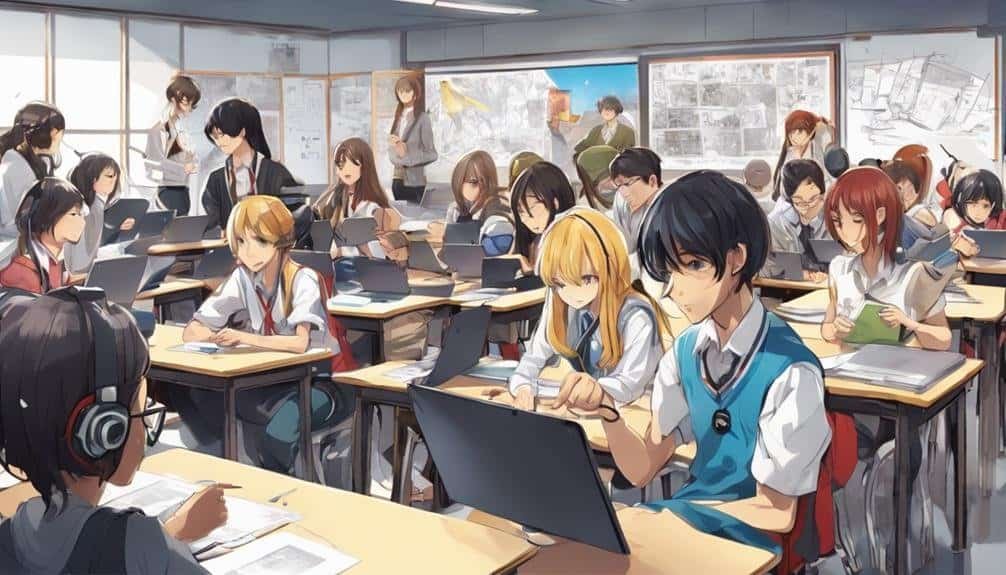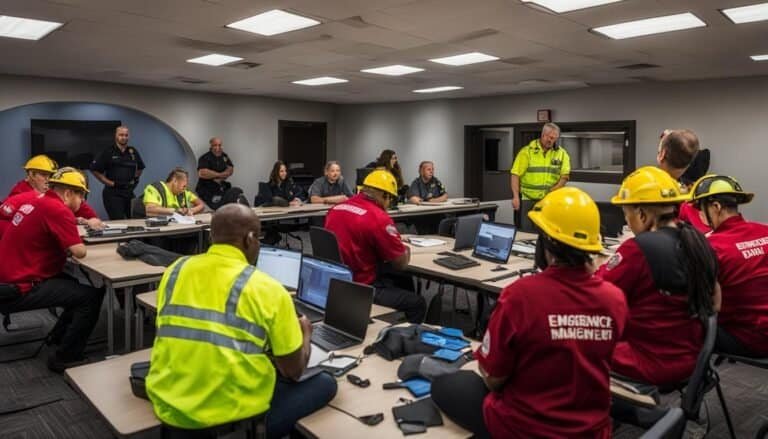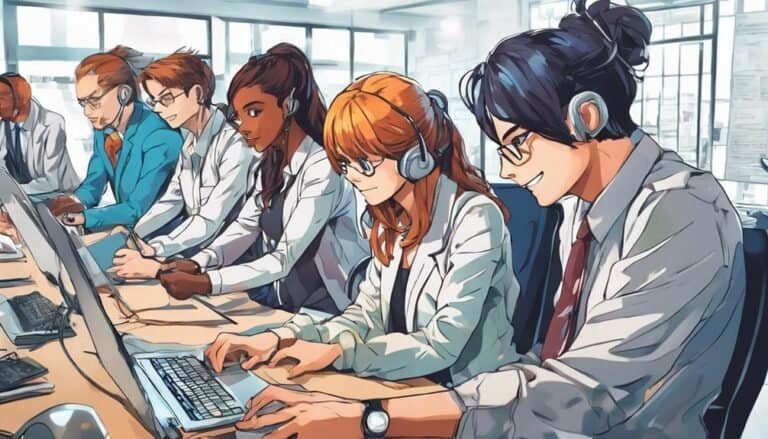Teaching Strategies for Modern Educators: Enhance Your Impact
In the ever-evolving landscape of education, modern educators face the challenge of continuously adapting their teaching strategies to meet the diverse needs of today's learners.
By exploring innovative approaches that leverage technology, foster a growth mindset, and prioritize student engagement, educators can greatly enhance their impact in the classroom.
Embracing inclusive practices, project-based learning, and effective assessment techniques are key components in creating a dynamic learning environment.
However, one essential element often underestimated but paramount in driving student success is the establishment of strong relationships between educators and their students.
Key Takeaways
- Utilize technology for interactive engagement and gamified lessons.
- Foster resilience and a growth mindset in students through praise and perseverance.
- Promote student-centered learning to enhance autonomy and collaboration.
- Embrace diversity, inclusion, and multiculturalism for a richer learning environment.
Leveraging Technology for Engagement
In the domain of modern education, educators are increasingly utilizing technology as a powerful tool to enhance student engagement and learning outcomes. Interactive simulations and gamified lessons are two innovative approaches that have gained traction in recent years. Interactive simulations allow students to manipulate variables in a controlled environment, facilitating a deeper understanding of complex concepts. By engaging with these simulations, students can actively participate in their learning process, making it more interactive and experiential.
Gamified lessons, on the other hand, incorporate game elements into educational content, such as rewards, points, and competition. This approach can motivate students by tapping into their natural inclination towards play and challenge. Through gamification, educators can create a more dynamic and engaging learning environment that encourages active participation and boosts student motivation.
Cultivating a Growth Mindset
Embracing the concept of cultivating a growth mindset in modern education involves fostering a mentality that values perseverance, learning from setbacks, and embracing challenges as opportunities for growth and development. In today's fast-paced world, fostering resilience and developing flexibility are essential skills for students to navigate the complexities of the future. By instilling perseverance and encouraging adaptability, educators can empower learners to view obstacles as stepping stones to success rather than barriers to achievement.
To cultivate a growth mindset, educators should provide opportunities that challenge students to think critically, problem-solve, and reflect on their learning journey. Encouraging a positive attitude towards mistakes and failures can help students understand that setbacks are not permanent but rather opportunities for growth. By praising efforts, strategies, and progress rather than just outcomes, teachers can shift the focus from success or failure to the process of learning itself.
Ultimately, promoting a growth mindset in education is about equipping students with the skills and mindset needed to thrive in an ever-changing world. Through fostering resilience, developing flexibility, instilling perseverance, and encouraging adaptability, educators can prepare learners to face challenges with confidence and determination.
Promoting Student-Centered Learning
Encouraging autonomy and active engagement in the learning process is pivotal in fostering student-centered learning environments that prioritize individual growth and development. By incorporating collaborative projects and interactive discussions, educators can create dynamic spaces where students take ownership of their learning journey. Collaborative projects provide opportunities for students to work together, share ideas, and learn from one another, fostering a sense of teamwork and collective achievement. These projects also simulate real-world scenarios where collaboration and communication are essential skills.
Interactive discussions serve as a platform for students to express their thoughts, ask questions, and engage in critical thinking. Through discussions, students can deepen their understanding of the material, challenge their peers, and refine their communication skills. Additionally, interactive discussions encourage active participation and help students develop the confidence to voice their opinions in a respectful and constructive manner.
Promoting student-centered learning through collaborative projects and interactive discussions empowers students to become active participants in their education, fostering a sense of responsibility and a passion for learning.
Embracing Diversity and Inclusion
Exploring the diverse perspectives and backgrounds within educational settings enriches the learning experience for all individuals involved. Celebrating differences and fostering belonging are essential components of creating an inclusive learning environment. Modern educators must recognize the value that diversity brings to the classroom, not only regarding different cultures, but also concerning varied learning styles, abilities, and experiences. By acknowledging and embracing this diversity, educators can create a more welcoming and supportive atmosphere where every student feels valued and respected.
Incorporating inclusive teaching practices involves actively seeking out diverse perspectives, integrating multicultural content into the curriculum, and creating opportunities for students to share their unique backgrounds. By doing so, educators can help students develop a deeper understanding and appreciation for the world around them. Embracing diversity and inclusion also means being mindful of biases and stereotypes that may exist within the educational setting, and taking steps to address and dismantle them.
Incorporating Project-Based Learning
Incorporating project-based learning into modern educational practices offers a myriad of benefits. It ranges from enhancing critical thinking skills to fostering creativity and collaboration among students. By engaging students in hands-on projects that require problem-solving and decision-making, educators can cultivate a deeper level of understanding and retention of the material being taught.
This approach not only empowers students to take ownership of their learning but also prepares them for real-world challenges they may encounter in their future careers.
Benefits of Projects
Utilizing project-based learning in educational settings offers an array of benefits that enhance student engagement, critical thinking skills, and real-world application of knowledge.
By engaging in collaborative learning experiences through projects, students can work together, share ideas, and learn from one another, fostering a sense of teamwork and community.
Hands-on experiences provided by projects allow students to apply theoretical concepts to practical situations, aiding in a deeper understanding of the subject matter.
Moreover, projects encourage creativity, problem-solving skills, and decision-making abilities as students navigate through the challenges presented.
Engaging Student Participation
Engaging students through project-based learning fosters active participation and enhances their understanding of complex concepts by providing hands-on experiences and collaborative opportunities. To create an environment that truly captivates students, educators can incorporate the following strategies:
- Utilize interactive activities: Encourage students to engage with the material actively through hands-on tasks and group discussions.
- Promote peer collaboration: Foster a sense of teamwork and shared responsibility among students to enhance their learning experience.
- Integrate gamification: Implement game elements to make learning more enjoyable and increase student motivation.
- Connect learning to real-world applications: Show students how the knowledge they acquire in the classroom is relevant and applicable to their lives outside of school.
Implementing Formative Assessment Strategies
In the domain of modern education, the utilization of formative assessment strategies plays an essential role in understanding student progress. Quick check-ins provide educators with valuable insights into student comprehension levels, allowing for timely interventions to support learning.
Additionally, the systematic tracking of student progress enables educators to tailor their teaching methods to address individual needs effectively.
Quick Check-ins
Periodically evaluating student understanding through brief and targeted check-ins is an effective way to implement formative assessment strategies in the classroom. These quick check-ins can provide valuable insights into student comprehension and help educators tailor their teaching accordingly.
To enhance this practice, consider the following innovative approaches:
- Encourage Daily Reflections: Prompt students to reflect on their learning each day to deepen understanding.
- Facilitate Peer Feedback: Incorporate opportunities for students to provide constructive feedback to their peers.
- Utilize Interactive Polls: Engage students by using interactive polls to gauge understanding in real-time.
- Implement Exit Tickets: Use exit tickets as a quick way to assess student learning before they leave the classroom.
Student Progress Tracking
Implementing effective student progress tracking methods is essential for educators looking to enhance formative assessment strategies in the classroom. By utilizing data analysis, teachers can gain valuable insights into each student's learning journey.
Tracking student progress allows educators to identify areas where students may be struggling and intervene with targeted intervention strategies promptly. Through the systematic collection and analysis of data, teachers can tailor their teaching approaches to meet the specific needs of individual students.
This personalized approach not only improves student outcomes but also fosters a more supportive and inclusive learning environment. By implementing student progress tracking techniques that prioritize data analysis and intervention strategies, educators can optimize their formative assessment practices and ultimately enhance student learning experiences.
Building Strong Relationships With Students
Establishing genuine connections with students is a cornerstone of effective teaching practices in the modern educational landscape. Building strong relationships with students goes beyond just delivering content; it involves fostering trust, understanding, and mutual respect. Here are four key strategies to enhance student-teacher relationships:
- Effective Communication Skills: Communication is key to building relationships. Educators need to actively listen to students, provide constructive feedback, and encourage open dialogue to create a supportive learning environment.
- Trust Building: Trust is the foundation of any relationship. Teachers can build trust by being reliable, honest, and approachable. When students trust their educators, they are more likely to engage in the learning process and seek guidance when needed.
- Empathy and Understanding: Showing empathy towards students' challenges and understanding their perspectives can strengthen the bond between teachers and learners. Empathetic educators create a safe space where students feel valued and supported.
- Personalized Support: Recognizing the individuality of each student and offering personalized support demonstrates care and investment in their success. Tailoring instruction to meet students' unique needs fosters a sense of belonging and motivates them to reach their full potential.
Conclusion
To sum up, adopting innovative teaching strategies is akin to adding fuel to a fire, igniting a passion for learning in students.
By leveraging technology, cultivating a growth mindset, promoting student-centered learning, embracing diversity and inclusion, incorporating project-based learning, implementing formative assessment strategies, and building strong relationships with students, educators can enhance their impact and create a dynamic and engaging learning environment.







